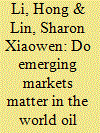|
|
|
Sort Order |
|
|
|
Items / Page
|
|
|
|
|
|
|
| Srl | Item |
| 1 |
ID:
099159


|
|
|
|
|
| Publication |
2010.
|
| Summary/Abstract |
Using data from 1986-2005, the present paper estimates the impact of direct knowledge spilled over from G-7 countries on China's economy. We use telephone line penetration rates and personnel flows to estimate the direct spillover effect. Our results show that direct knowledge spillovers through telecommunication networks and personnel flows are important components of international R&D spillovers in China. These direct channels of spillover effectively accelerate China's economic growth. Therefore, China should invest more in human capital and in its telecommunication network to enhance the absorptive capacity of direct R&D spillovers, and to increase communication with other nations, in particular the USA and Japan. More subsidies to domestic R&D research and purchase of intermediate goods will help to raise China's R&D intensity.
|
|
|
|
|
|
|
|
|
|
|
|
|
|
|
|
| 2 |
ID:
107635


|
|
|
|
|
| Publication |
2011.
|
| Summary/Abstract |
This paper provides empirical evidence on the changing structure of world oil price system by identifying an additional driver-emerging market factor. We choose China and India as a representative of emerging markets to examine if the quantity of crude oil imported by China and India is significant in the existing oil pricing system (Kaufmann et al., 2004). Our data starts from January 2002 and ends in March 2010, which includes the oil shock of 2007-2008. We utilize cointegration and error correction model framework developed by Engle-Granger (1987) and Gregory-Hansen (1996) in the analysis. Our results indicate that demand from emerging markets has become a significant factor in the world oil pricing system since 2003. This result is significant as it lends empirical support to the widely held conjecture that the oil shock of 2007-2008 is a demand-led shock (Hamilton, 2009). Our result also has significant policy implications that go beyond the oil shock. The emerging market factor is there to stay and reflects the changing power between emerging and developed economies in the world economic system as a result of decades of fast economic development in the former. It will certainly influence policy issues related to oil and beyond.
|
|
|
|
|
|
|
|
|
|
|
|
|
|
|
|
| 3 |
ID:
107494


|
|
|
|
|
| Publication |
2011.
|
| Summary/Abstract |
Fossil energy subsidies reform would be an effective way to improve the energy consumption structure; however, the reform needs to be assessed comprehensively beforehand as it would exert uncertain impacts on economy, society and environment. In this paper, we use price-gap approach to estimate the fossil energy subsidies of China, then establish CGE model that contains pollutant emissions accounts and CO2 emissions account to stimulate the fossil energy subsidies reform under different scenarios, and the environmental economic analysis concept is introduced to monetize the pollutant reduction benefits. Furthermore, we analyze the possibility and scope of improving the energy consumption structure from the perspective of technical and economic analysis. Analytical results show that the energy consumption structure could be improved by different extent by removing coal or oil subsidies, while the economic and social indexes will be influenced distinctively. Meanwhile, the effects of cutting coal subsidies are more feasible than that of cutting oil subsidies overall. It is recommended to implement fossil energy subsidies gradually, cut the coal first and then cut oil subsidies successively.
|
|
|
|
|
|
|
|
|
|
|
|
|
|
|
|
| 4 |
ID:
090107


|
|
|
|
|
| Publication |
2009.
|
| Summary/Abstract |
Economic theory posits numerous channels through which FDI might create positive spillovers for domestic firms. However, the results of empirical studies that have sought to document these spillovers have been mixed. One explanation for this variation is that the capacity of domestic firms to absorb spillovers might vary. In the present paper, we explore these issues in the case of China. Aside from being one of the world's leading hosts of foreign direct investment, China makes for an interesting case study because its provinces vary greatly with respect to those factors most commonly held to influence absorptive capacity, such as the initial level of technology in domestic firms. This paper begins by empirically establishing that the spillovers from foreign direct investment do indeed vary across provinces. Threshold values for various factors that influence absorptive capacity factors are then estimated and it is found that conditions in many provinces presently fall short of these values. This provides an obvious focus of attention for China's policy-makers.
|
|
|
|
|
|
|
|
|
|
|
|
|
|
|
|
|
|
|
|
|